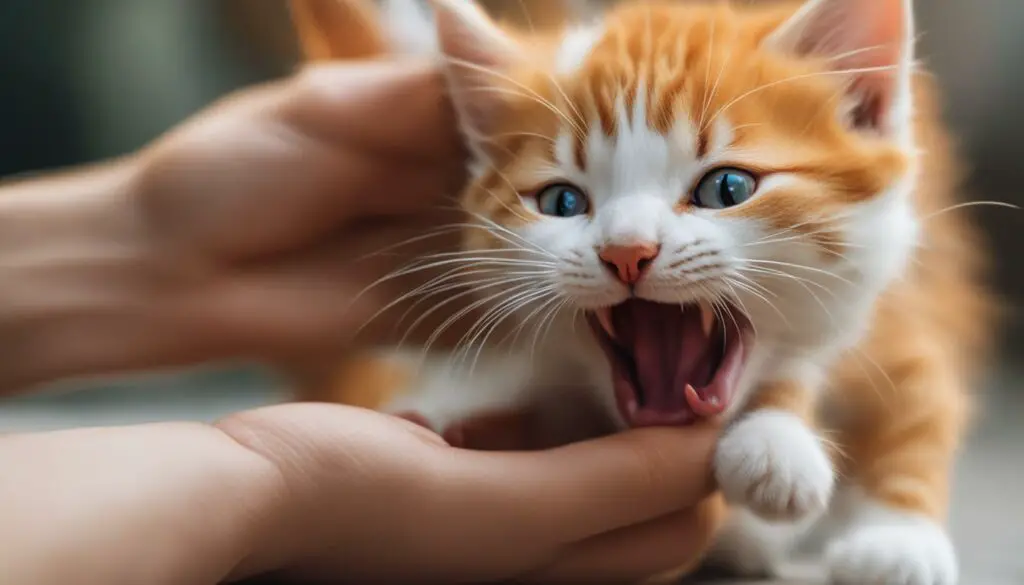If you’re struggling with a kitten biting your fingers, don’t worry, it’s a normal behavior for kittens. They explore their world with their mouths and use playtime to learn bite inhibition. Biting usually decreases as the kitten ages and disappears by 12 months. To stop this behavior, it’s important to provide appropriate objects for biting, avoid using your fingers or toes as toys, and be consistent in teaching your kitten what is acceptable.
Key Takeaways:
- It’s normal for kittens to bite fingers during play.
- Provide appropriate objects for biting to redirect their attention.
- Avoid using your fingers or toes as toys.
- Teach your kitten what is acceptable through consistent training.
- Biting usually decreases as the kitten ages.
Why Do Kittens Bite?
Understanding why kittens bite is crucial in addressing and redirecting their behavior. Kittens bite for various reasons, and it is essential to recognize these underlying causes to effectively curb their biting habits. One of the primary reasons kittens bite is during play. This behavior mimics hunting and helps them learn bite inhibition from their littermates. Biting also occurs when kittens are teething, which typically happens when they are around 2 weeks old and again at around 4 months.
If a kitten is separated from their littermates too early, they may have a harder bite, as they haven’t had the opportunity to learn proper bite inhibition. Additionally, some kittens may bite out of fear or as a defensive response when they feel threatened or trapped. By understanding the reasons behind their biting, we can provide appropriate training and redirection to help them develop gentle play behaviors.
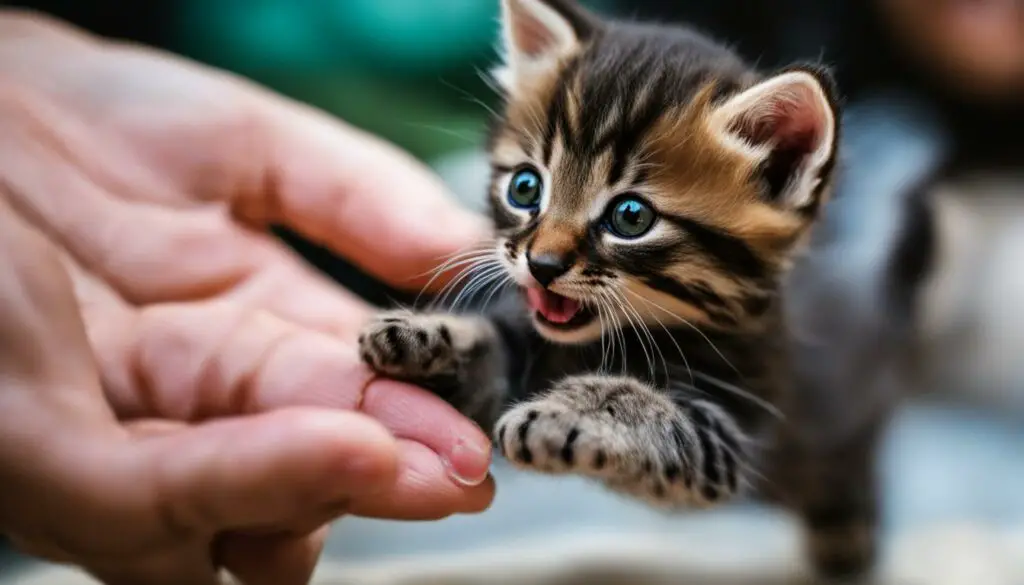
Kittens bite during play to mimic hunting and learn bite inhibition. They may also bite when teething or feeling scared. Understanding the reasons behind their biting can help in redirecting their behavior.
Teach Gentle Play
Teaching your kitten gentle play is crucial in curbing biting behavior. When your kitten bites you during play, say “OW!” in a loud voice to let them know it hurt. Gently remove your body part from their grasp and place them on the floor. Redirect their attention to a toy and reward them with play if they don’t bite again. Consistency is key in teaching them that biting is not acceptable. Avoid physical punishment, as it can harm your relationship with your kitten.
Avoid Using Hands as Toys
To effectively teach your kitten gentle play, it’s important to avoid using your hands or fingers as toys. This can confuse them and reinforce the behavior of biting. Instead, provide them with a variety of appropriate toys that they can engage with. Wand toys, balls, and other interactive toys that allow your kitten to pounce, chase, and bite are great alternatives. By redirecting their play onto these toys, you can help them learn appropriate biting behavior.
Consistency in Training
Consistency is key when training your kitten not to bite. Every time they bite, respond with a firm “OW!” and remove your hand or body part gently. This consistent reaction helps your kitten understand that biting leads to the end of playtime. Reward them with praise and play when they engage with toys instead of biting. It may take time and patience, but with consistent training, your kitten will learn that gentle play is the preferred behavior.
Building Trust and Bond
Teaching your kitten gentle play not only curbs biting behavior but also helps build trust and strengthen the bond between you. By providing a safe and enjoyable play environment, your kitten will learn to associate playtime with positive experiences. Remember to be patient and kind throughout the training process and celebrate small victories. The more trust and love you establish with your kitten, the easier it will be to address and overcome any behavioral issues.
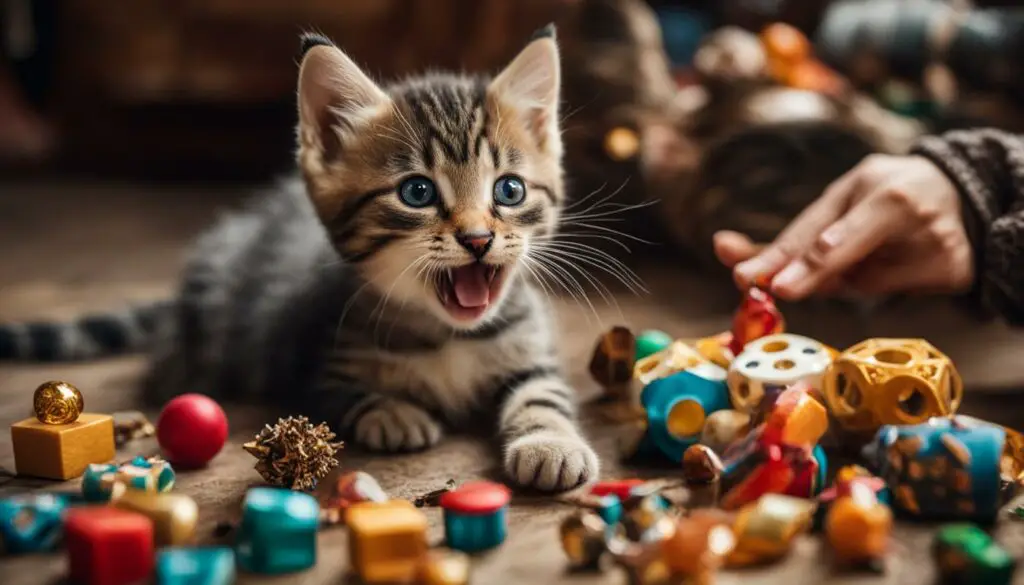
Provide Appropriate Toys
When it comes to addressing kitten biting behavior, providing appropriate toys is crucial. By redirecting their play onto toys, you can help discourage them from biting your fingers. Avoid using your hands or feet as toys, as this can inadvertently reinforce the biting behavior. Instead, opt for interactive toys that engage their natural instincts and keep them entertained.
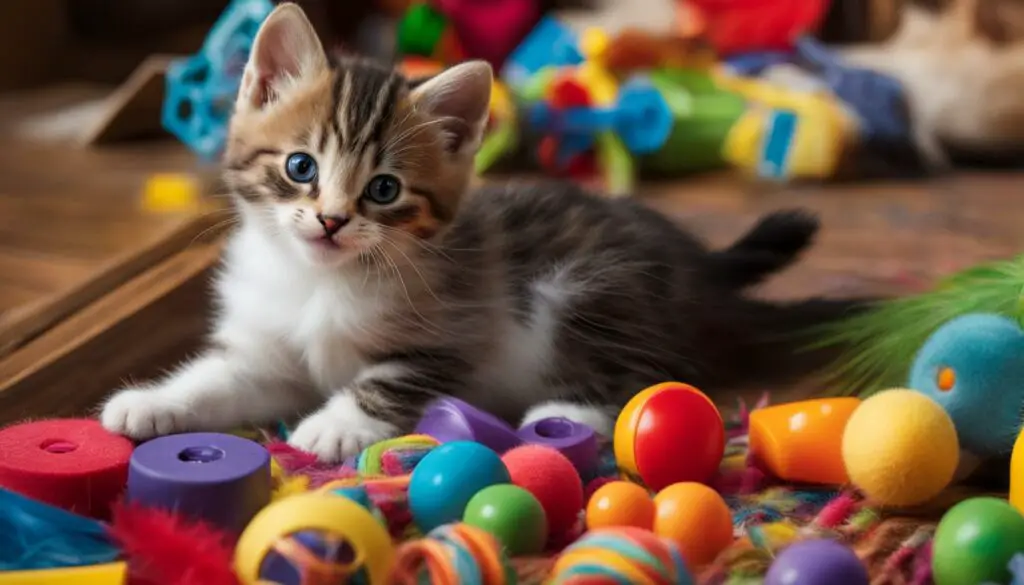
Wand toys are particularly effective in redirecting their attention away from your fingers. These toys allow you to control the play while keeping your hands safe. The dangling feather or string can mimic the movement of prey, stimulating their hunting instincts and encouraging them to pounce and bite on the toy instead.
Table: Recommended Kitten Toys
| Toy | Description |
|---|---|
| Interactive Wand Toy | A wand with feathers, strings, or other attachments that mimic prey. |
| Balls | Small balls that encourage chasing and batting. |
| Laser Pointer | A toy that emits a laser beam for your kitten to chase. |
| Treat Dispenser Toy | A toy that dispenses treats when your kitten plays with it, providing both mental and physical stimulation. |
When selecting toys, make sure they are safe and sturdy. Avoid toys with small parts that can be easily chewed off and swallowed. Also, supervise your kitten during playtime to prevent any accidents or injuries that may occur with unsupervised play. By providing appropriate toys, you can satisfy your kitten’s need for play and discourage biting behavior.
Use Playtime as Bonding Time
During playtime with your kitten, you have the opportunity to strengthen your bond and create a positive connection. Engaging in interactive play sessions can not only provide mental and physical stimulation for your kitten but also build trust and affection between the two of you.
One way to make playtime more enjoyable and prevent your kitten from biting your fingers is by using a variety of appropriate toys. Wand toys are highly recommended as they allow your kitten to grab and bite something other than your hands. The movement of the wand can mimic the prey and engage your kitten’s hunting instincts. Remember to supervise your play sessions and avoid leaving your kitten unsupervised with toys that can be easily destroyed or swallowed.
Additionally, it’s essential to provide breaks and rest periods during playtime. Kittens have bursts of energy, and they can become overly excited, which may lead to biting. By giving them regular breaks, you can prevent them from getting too worked up and reduce the risk of biting behavior.
Overall, playtime should be a positive and enjoyable experience for both you and your kitten. It offers an opportunity for bonding, mental stimulation, and teaching appropriate play behavior. By using a variety of toys, providing breaks, and supervising play sessions, you can make playtime a rewarding and bite-free experience.
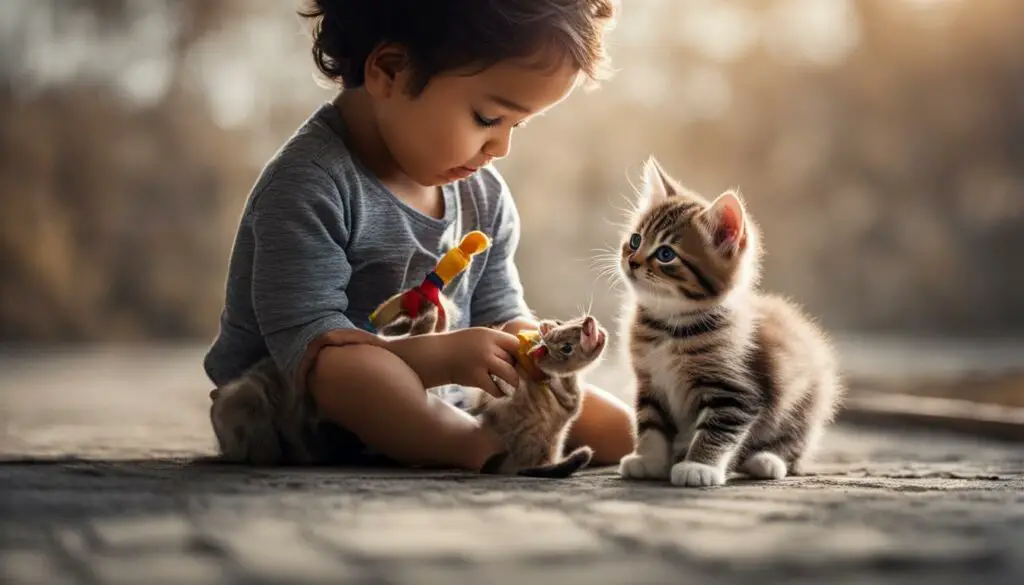
Consistency is Key
To effectively train your kitten to stop biting fingers, consistency is crucial. Your cat cannot distinguish between different people or occasions where biting might be allowed. It’s important to teach your kitten that biting is never acceptable behavior. When your kitten bites, respond with a firm “OW!” and gently remove your hand. This sends a clear message that biting hurts and playtime ends when they bite.
To reinforce positive behavior, reward your kitten with play if they refrain from biting again. By consistently reinforcing the message that biting is not acceptable, your kitten will learn that gentle play is the preferred behavior. Avoid physical punishment, as it only creates fear and damages the bond with your cat.
Remember, training takes time and patience. Celebrate small victories and progress along the way. Building a loving and trusting relationship with your kitten is just as important as curbing the biting behavior. With consistency and positive reinforcement, you can successfully teach your kitten to engage in gentle play and develop bite inhibition.
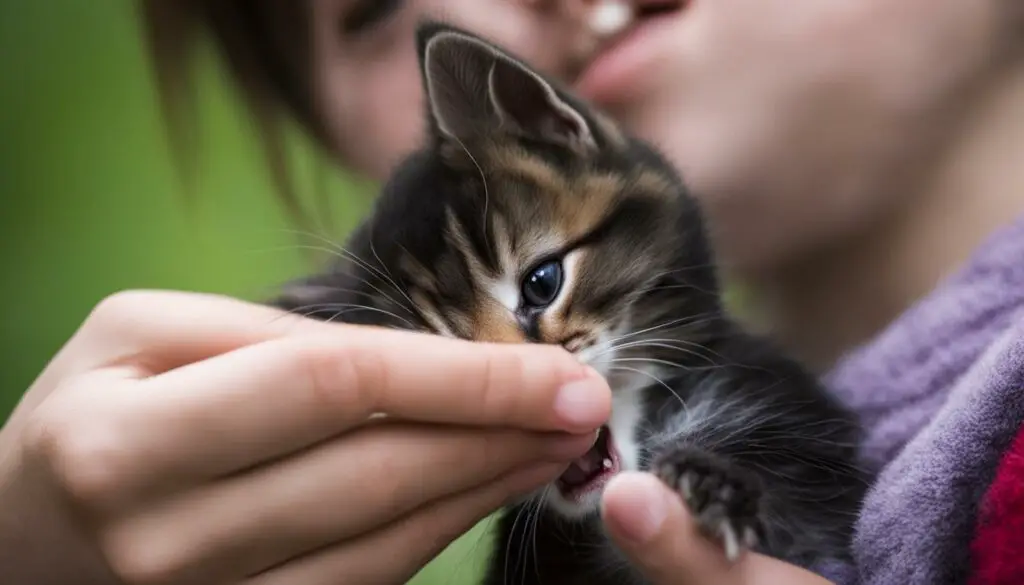
| Consistency Tips | Explanation |
|---|---|
| Use a firm “OW!” | Let your kitten know that biting hurts by vocalizing your discomfort. |
| Remove your hand gently | Send a clear message that playtime ends when biting occurs. |
| Reward with play | Reinforce positive behavior by providing an alternative outlet for play. |
| Avoid physical punishment | Physical punishment can create fear and damage your relationship with your kitten. |
Consistency breeds success
By consistently applying these techniques, your kitten will learn that biting is not acceptable and that gentle play is more rewarding. Remember to be patient and kind throughout the training process. Celebrate progress, no matter how small, and focus on building a loving and trusting relationship with your furry companion.
Teach Bite Inhibition
Teaching your kitten bite inhibition is crucial in fostering gentle play behavior. This skill helps them understand how to control the force of their bites and prevents them from causing unintentional harm. It is especially important for kittens that have not had the opportunity to learn this skill from their littermates.
To teach bite inhibition, I recommend using consistent discipline combined with redirection. When your kitten bites you, say “OW!” in a firm but not aggressive tone to let them know it hurts. Then, immediately redirect their attention to a toy, such as a stuffed animal or a wand toy. This helps them understand that biting humans is not acceptable but biting toys is welcome.
It may take time and patience to teach bite inhibition effectively. Remember to praise and reward your kitten when they engage with the toy instead of biting you. This positive reinforcement reinforces their good behavior and encourages them to repeat it. With consistent training, your kitten can learn to engage in gentle play, reducing the incidence of painful bites.
| Bite Inhibition Training Steps: | Tips: |
|---|---|
| 1. Say “OW!” when bitten and immediately redirect to a toy. | – Use a firm but not aggressive tone when saying “OW!” |
| 2. Praise and reward your kitten when they engage with the toy instead of biting you. | – Use treats or gentle strokes as rewards |
| 3. Be patient and consistent in your training efforts. | – It may take time for your kitten to learn bite inhibition. |
Remember, teaching bite inhibition is a gradual process that requires patience and understanding. By using consistent discipline and positive reinforcement, you can help your kitten develop gentle play behavior and reduce the frequency of painful bites.
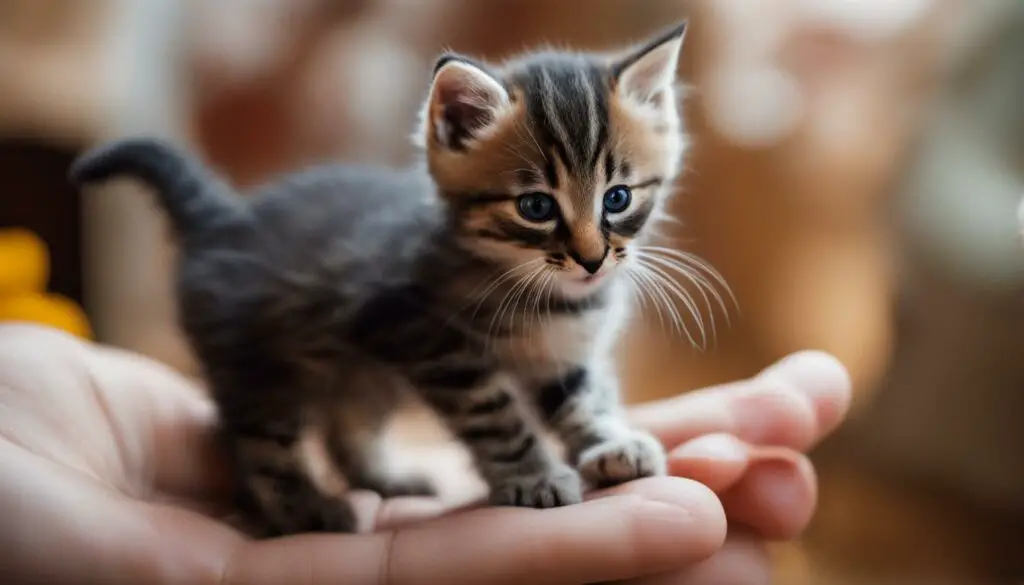
Tire Your Kitten Out
If you find that your kitten is prone to biting during play, one effective strategy is to tire them out. Kittens have bursts of energy and can become overly excited, which can lead to biting behavior. Engaging your kitten in vigorous games and exercise can help prevent this. Use interactive toys, such as wand toys or feather teasers, to keep your hands and feet at a safe distance while still providing an outlet for your kitten’s energy. Chase games, where you use a toy on a string to mimic prey, can also be beneficial. Remember to provide breaks for your kitten to rest, as they can only play in short bursts for a few minutes at a time.
Regular play and exercise not only help tire your kitten out but also provide mental and physical stimulation, which is essential for their overall well-being. It is recommended to have dedicated playtime sessions with your kitten every day to ensure they get the exercise they need. Not only will this help reduce biting incidents, but it will also strengthen the bond between you and your kitten.
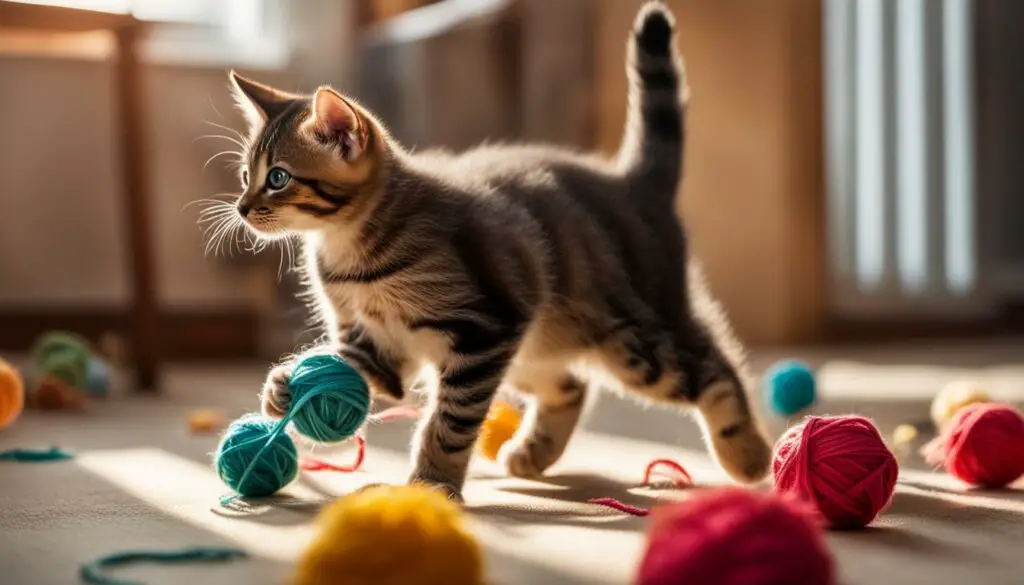
Playing with toys that mimic prey and engaging in interactive play also satisfies your kitten’s natural hunting instincts in a safe and appropriate way. It’s important to provide a variety of toys that challenge their skills and keep them mentally stimulated. Rotate the toys regularly to keep their interest and prevent boredom. By tiring your kitten out through play, you can help reduce their biting behavior and create a calmer and happier environment for both of you.
Benefits of Tiring Your Kitten Out:
- Prevents excessive energy buildup
- Reduces biting incidents during play
- Provides mental and physical stimulation
- Strengthens the bond between you and your kitten
- Satisfies natural hunting instincts
Remember, consistent play and exercise are key to managing your kitten’s biting behavior. Be patient and use positive reinforcement to encourage gentle play. With time and commitment, you will be able to enjoy playtime with your kitten without the worry of painful bites.
Avoid Boredom
Kittens are energetic and curious creatures, and when they get bored, they may resort to biting as a form of entertainment. To prevent boredom and minimize biting incidents, it’s important to provide your kitten with plenty of toys and mental stimulation.
One effective way to keep your kitten engaged is to rotate their toys regularly. Introduce new toys and put away old ones for a while before bringing them back out. This helps maintain novelty and keeps your kitten interested in their playthings.
Interactive toys, such as puzzle toys or treat dispensers, are great options to combat boredom. These toys require your kitten to use their problem-solving skills and provide mental stimulation. They can keep your kitten entertained for longer periods of time, reducing their urge to bite as a result of boredom.
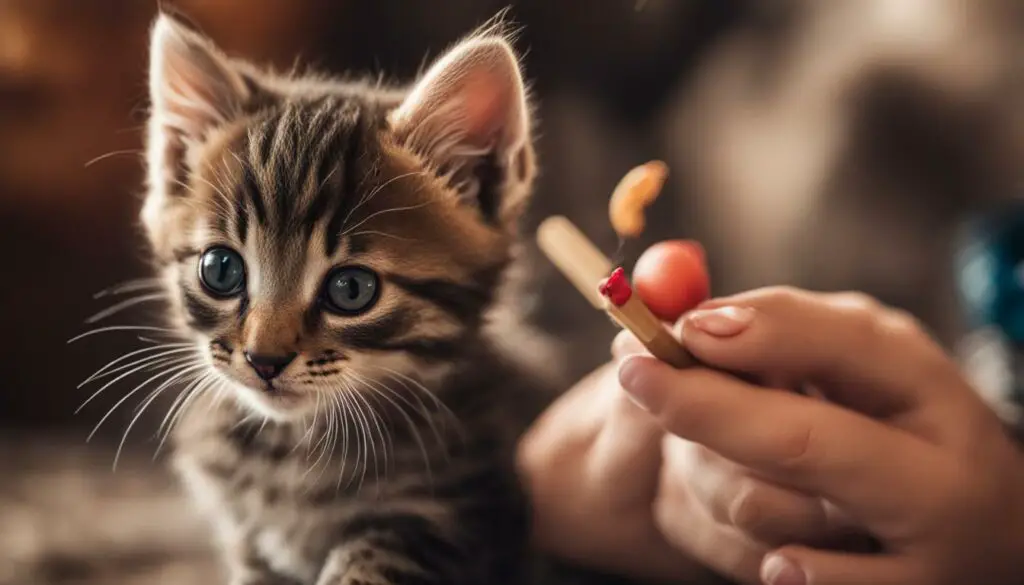
| Benefits of Interactive Toys | Types of Interactive Toys |
|---|---|
|
|
Another option is to use battery-operated toys that have programmed movements. These toys can activate at specific times of the day, providing entertainment and engagement even when you’re not around. They simulate the movement of prey, triggering your kitten’s natural hunting instincts and keeping them entertained for hours.
By addressing your kitten’s boredom with a variety of toys and mental stimulation, you can reduce their biting behavior and create a more harmonious environment for both of you.
Redirect or Disengage
If your kitten bites you during play, it’s essential to redirect their behavior in a positive way. Reacting appropriately can help them understand that biting humans is not acceptable. Say “no” in a firm voice and immediately disengage from the play session. Offer them a toy to play with instead, focusing their attention on an appropriate object for biting. Praising them when they engage with the toy reinforces the desired behavior and redirects their playfulness. By consistently redirecting their biting behavior, you can effectively modify their behavior and protect your fingers from sharp teeth.
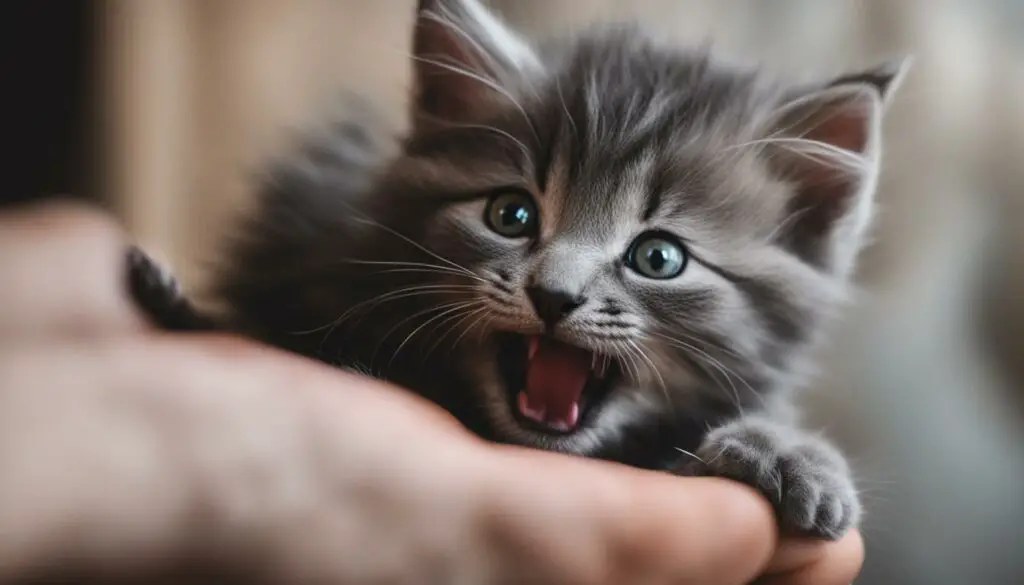
Positive reinforcement plays a crucial role in training your kitten. Rewarding good behavior, such as gentle play or engaging with toys instead of biting, can help strengthen the desired actions. Use treats, praise, and affection to show your kitten that their appropriate behavior leads to positive outcomes. Consistency is key, so be sure to reinforce their good behavior consistently and repetitively. By focusing on positive reinforcement and providing alternative outlets for play, you can encourage your kitten to engage in gentler and more acceptable behavior.
It’s important to remember that redirection is a more effective approach than punishment when it comes to training your kitten. Physical punishment can create fear and damage the bond between you and your furry friend. Instead, focus on positive reinforcement and redirection as your primary tools for teaching them appropriate behavior. Celebrate small victories along the way and be patient with your kitten as they learn and adapt to their new training. With time, consistency, and a loving approach, you can successfully redirect their biting behavior and foster a harmonious relationship with your playful companion.
Be Patient and Kind
Training a kitten to stop biting requires time, patience, and a gentle approach. Remember, kittens are curious and playful creatures, and biting is a natural behavior for them to explore their world. It’s important to be patient and understanding while teaching them appropriate boundaries. Yelling or hitting your kitten will only create fear and damage the trust between you.
Instead, focus on positive reinforcement and consistency. When your kitten bites, calmly say “ow” and remove your hand. Offer them an appropriate toy to redirect their attention, and praise them when they engage with it. This teaches them that biting humans is not acceptable behavior. Celebrate small victories and progress, and always prioritize building a loving and trusting relationship with your kitten.
Remember that training takes time, and it’s important to be consistent in your approach. Each interaction with your kitten is an opportunity for learning, so be patient and kind. With your guidance and love, your kitten will gradually learn to engage in gentle play and develop better bite inhibition.
Addressing Specific Situations
When it comes to addressing specific situations where your kitten is more prone to biting, understanding their behavior and providing a safe environment is crucial. If your kitten feels trapped or scared, it’s essential to respect their boundaries and avoid forcing interaction. Allow them to escape and create a comforting space where they can feel secure.
Building a positive association with specific situations can also help reduce fear and aggression. For example, if your kitten is wary of children, you can associate children with treats and positive experiences. This can gradually help your kitten feel more comfortable and less likely to exhibit biting behavior in those situations.
“By understanding your kitten’s individual triggers and providing positive reinforcement, you can help them navigate specific situations with confidence and minimize biting incidents,” says feline behavior expert Dr. Jane Smith.
It’s important to remember that every kitten is unique, and addressing specific situations may require patience and consistency. By creating a positive and nurturing environment, you can help your kitten feel safe and reduce their inclination to bite.
| Situation | Approach |
|---|---|
| Feeling trapped or scared | Respect boundaries and allow escape |
| Wary of children | Associate children with treats and positive experiences |
| Aggression during grooming | Gradually introduce grooming activities, use positive reinforcement and treats |
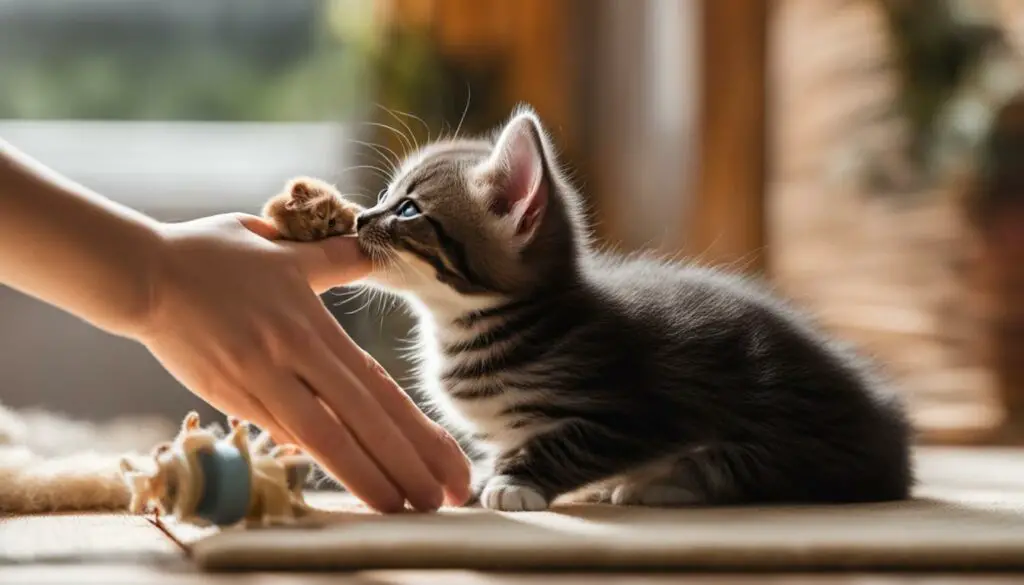
Table: Approaches to Addressing Specific Situations
Use Positive Reinforcement
When it comes to training your kitten to stop biting, positive reinforcement is a highly effective method. By rewarding desired behaviors and providing positive outcomes, you can encourage your kitten to engage in gentle play and avoid biting fingers.
Positive reinforcement can be implemented in various ways. One approach is to offer treats when your kitten exhibits gentle play or interacts with toys instead of biting. This associates good behavior with a positive reward, reinforcing the desired actions. Additionally, praise and affection can serve as forms of positive reinforcement, showing your kitten that their appropriate behavior is valued and appreciated.
Consistency is key when using positive reinforcement. Be sure to reward your kitten every time they engage in gentle play or refrain from biting fingers. This helps them understand that their desired behavior consistently leads to positive outcomes. With repetition and reinforcement, your kitten will gradually learn that biting is not acceptable and will opt for gentler ways to play.
| Gentle Play | Negative Reinforcement |
|---|---|
| Your kitten plays with toys instead of biting your fingers. | Your kitten bites your fingers during playtime. |
| You reward your kitten with treats and praise, reinforcing the gentle play. | You immediately disengage from playtime and redirect their attention to a toy, ensuring they understand that biting ends the play. |
| Your kitten learns that playing with toys and exhibiting gentle behavior results in positive outcomes. | Your kitten learns that biting leads to the end of playtime. |
Positive reinforcement not only helps train your kitten to stop biting fingers but also strengthens the bond between you and your furry friend. By focusing on positive interactions and rewards, you create a positive and trusting relationship, enhancing your overall connection.
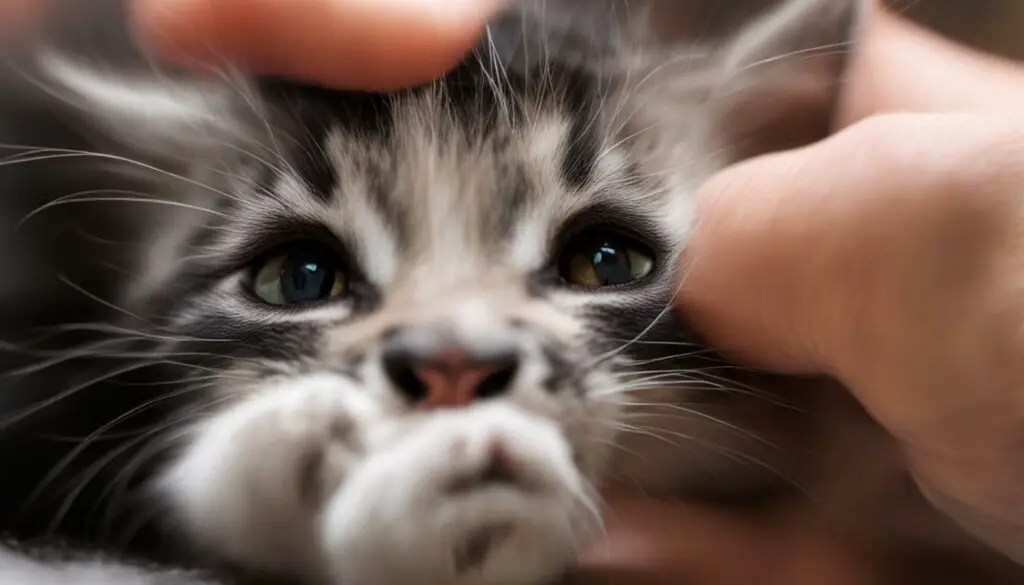
Benefits of Positive Reinforcement
- Encourages gentle play and reduces biting behavior
- Strengthens the bond between you and your kitten
- Positive association with training and playtime
- Provides a constructive and effective training method
- Builds trust and reinforces positive behavior
Remember, training your kitten requires patience and consistency. By utilizing positive reinforcement and rewarding gentle play, you can guide your kitten towards appropriate behavior. With time and dedication, biting fingers will become a thing of the past, allowing for enjoyable and pain-free playtime with your furry companion.
Conclusion
Training your kitten to stop biting fingers requires patience, consistency, and understanding. By providing appropriate toys, redirecting their behavior, and using positive reinforcement, you can teach your kitten to engage in gentle play. With time and commitment, you can enjoy playtime with your kitten without worrying about painful finger bites.
Remember that kittens learn through play and exploration, so it’s important to foster a loving and trusting relationship with them. Avoid using physical punishment or negative reinforcement, as this can harm your bond with your kitten. Instead, focus on positive reinforcement by rewarding desired behaviors, such as gentle play or engaging with toys instead of biting.
Be patient and kind throughout the training process, celebrating small victories and progress. Avoid yelling or hitting your kitten, as this can create fear and have negative consequences. By consistently redirecting their biting behavior and providing alternative outlets for play, you can help modify their behavior effectively. Remember, a gentle and understanding approach is key in raising a well-behaved and happy kitten.
FAQ
Why do kittens bite?
Kittens bite for several reasons, including exploring their world, mimicking hunting behavior, and teething.
How can I teach my kitten gentle play?
When your kitten bites during play, say “OW!” and gently remove your body part. Redirect their attention to a toy and reward them if they don’t bite again.
What toys should I provide for my kitten?
Choose interactive toys such as wand toys and prey mimic toys like balls or laser toys. Make sure the toys are safe and sturdy.
How can playtime strengthen the bond with my kitten?
Playtime is an opportunity for bonding. Use a variety of appropriate toys to engage your kitten and create positive experiences.
How important is consistency in kitten training?
Consistency is crucial. Teach your kitten that biting is never acceptable and be consistent in your discipline and redirection.
What is bite inhibition and how can I teach it?
Bite inhibition is a skill kittens learn to control their biting. Teach bite inhibition by saying “OW!” and redirecting their attention to a toy.
How can I tire my kitten out to reduce biting behavior?
Engage your kitten in vigorous games and exercise to release their energy. Use toys on a string or chase games to keep your hands and feet at a safe distance.
How can I prevent boredom-related biting?
Provide your kitten with plenty of toys and rotate them regularly. Consider using interactive toys and battery-operated toys to keep them entertained.
What should I do if my kitten bites me during play?
Say “no” firmly and disengage from the play session. Offer them a toy to play with instead and reward them for engaging with the toy.
How should I approach kitten training with kindness?
Avoid yelling or hitting your kitten. Focus on positive reinforcement and building a loving and trusting relationship.
How can I address specific situations where my kitten is prone to biting?
Respect their boundaries and create a safe environment. Build positive associations and gradually expose them to the situations that trigger biting.
How effective is positive reinforcement in training kittens?
Positive reinforcement is powerful. Reward desired behaviors with treats, praise, and affection to encourage gentle play.
Source Links
- https://be.chewy.com/how-to-stop-kitten-biting/
- https://www.wikihow.com/Stop-a-Kitten-from-Biting
- https://www.purrfectpost.com/how-to-stop-a-cat-from-biting-when-playing/

